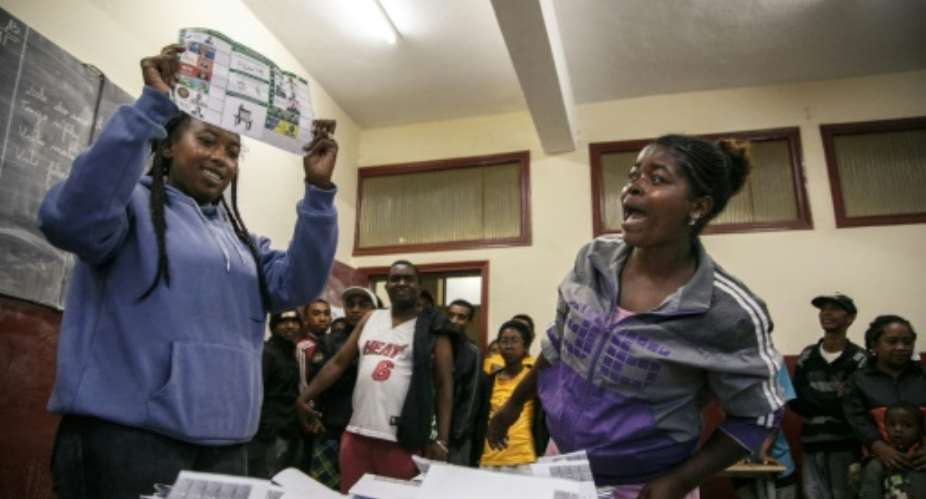Scrubbing a worn-out t-shirt at a public wash house in Madagascar's capital of Antananarivo a day after a hotly disputed presidential election, Germaine Razafindrakala, 77, has little doubt about who the winner will be.
"The next president is Rajoelina," she says without flinching, referring to the outgoing President, who was seeking re-election in Thursday's vote.
Many others agree, feeling no need to wait for the official results. Since the election was boycotted by most opposition candidates, victory for Andry Rajoelina, 49, always seemed a foregone conclusion.
 Andry Rajoelina casting his ballot on Thursday. Early projections show the President winning more than 70 percent of the vote. By MAMYRAEL (AFP)
Andry Rajoelina casting his ballot on Thursday. Early projections show the President winning more than 70 percent of the vote. By MAMYRAEL (AFP)
Indeed, early projections released by electoral authorities show the President winning more than 70 percent of the vote, with less than 10 percent of votes counted.
But that is unlikely to appease his opponents, who have disowned the vote and vowed to continue protesting until a fair election is held.
 Weeks of opposition protests preceded the election. By MAMYRAEL (AFP)
Weeks of opposition protests preceded the election. By MAMYRAEL (AFP)
The overcrowded capital city returned to its normal bustling life on Friday, after a calm vote that was preceded by weeks of protests.
In a narrow, sloping street, a uniformed police officer whistles to the traffic, frantically waving through vans, mopeds and old taxis.
Only a few days ago the same street was covered in orange umbrellas bearing the image Rajoelina, that were distributed to street vendors by the president electoral campaign.
"They reduce sales," said a mango seller, who preferred to remain anonymous.
'Life is hard'
Garlic sausages and cuts of Zebu, a local cattle breed, hung from metal hooks at a wooden hut housing the local butcher's shop.
A little further down the road, Risse Nampona, 22, sells cigarettes individually for a few cents. He has also folded away the orange umbrella.
 Map of Madagascar, where s presidential elections took place on Thursday.. By (AFP)
Map of Madagascar, where s presidential elections took place on Thursday.. By (AFP)
"Having a political colour doesn't interest me," he explained, taking a break from a "Law and Management" textbook -- and his dream of leaving the country.
"For us, it will be the same: life is hard and that doesn't change."
Ten of the 12 opposition candidates for the presidency had urged voters to shun the ballot complaining of an "institutional coup" in favour of Rajoelina.
On Thursday, they pointed to what they said was the lowest turnout in the electoral history of the Indian Ocean island, claiming they had the backing of most of the electorate.
"We do not recognise these elections and the Malagasy population in its great majority does not recognise them either," Hajo Andrianainarivelo, 56, told a press conference, speaking on behalf of the opposition group.
Only about 39 percent of the 11 million people who were registered to vote did so, according to early estimates by the electoral commission, which critics accuse of lacking impartiality.
But two senior sources at the electoral body speaking to AFP on condition of anonymity, on Thursday evening put the real figure is much lower, at less than 20 percent.
Results should be announced on November 24.
Successive crises
Madagascar is the leading global producer of vanilla but also one of the world's poorest countries.
It has been shaken by successive crises since independence from France in 1960 -- so the latest one has hardly caused any panic among Antananarivo residents.
"We hope that they will be able to come to an agreement," Rakotonirna Omnisoa, 48, says of the president and his opponents with little conviction.
"People fight to survive and avoid getting involved in politics," she adds, before returning to sell packets of instant noodles and bulk sugar in her modest grocery store.
Madagascar has been in turmoil since media reports in June revealed Rajoelina had acquired French nationality in 2014.
Under local law, the president should have lost his Madagascan nationality, and with it, the ability to lead the country, his opponents said.
From October, the opposition grouping, including two former presidents, has led near-daily, largely unauthorised protest marches.
Police have regularly dispersed them, firing tear gas.
Rajoelina first took power in 2009 on the back of a coup, then skipped the following elections only to make a winning comeback in 2018.





 “Stand and greet me”: Ban all NPP activities on your land until Akufo-Addo apolo...
“Stand and greet me”: Ban all NPP activities on your land until Akufo-Addo apolo...
 Election 2024: We won't allow you manipulate the process in favour of Bawumia — ...
Election 2024: We won't allow you manipulate the process in favour of Bawumia — ...
 GUM won't join Alan’s ARC – Osofo Kyiri Abosom
GUM won't join Alan’s ARC – Osofo Kyiri Abosom
 Jesus Christ died for people in his era, not for me – Osofo Kyiri Abosom
Jesus Christ died for people in his era, not for me – Osofo Kyiri Abosom
 Ejisu by-election: Vote for Kwabena Boateng to come and help me complete my work...
Ejisu by-election: Vote for Kwabena Boateng to come and help me complete my work...
 ‘He’s just hungry’ – NPP Germany takes Mr. Beautiful to the cleaners; schools hi...
‘He’s just hungry’ – NPP Germany takes Mr. Beautiful to the cleaners; schools hi...
 Politicians have hijacked ownership of media houses to suppress press freedom — ...
Politicians have hijacked ownership of media houses to suppress press freedom — ...
 Dumsor: Bawumia admits power challenges; assure Ghanaians they will be over soon
Dumsor: Bawumia admits power challenges; assure Ghanaians they will be over soon
 SML deal is just a modified form of the Agyapa deal – Bright Simons
SML deal is just a modified form of the Agyapa deal – Bright Simons
